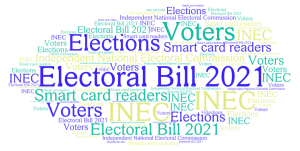After several agitations, protests, and increased anxiety, President Muhammadu Buhari finally signed the Electoral Act Amendment Bill.

The Electoral Amendment Bill 2022 is a revised version of the 2010 Electoral Bill with several provisions, such as the electronic transmission of results and early release of funds for INEC to conduct elections.
President Muhammadu Buhari had earlier rejected the bill in 2018 on the grounds that the bill could usurp the INEC’s constitutional power to decide on election affairs. Yet, by September the same year, the president declined the act citing the need to revise some clauses. On December 6, 2018, the president also turned down assent to the bill, citing the bill’s possibility of leading to uncertainty and confusion in the general election.
Here are some of the key provisions in the recently signed electoral amendment bill.
Section 3(3) of the bill provides that election funds due to the electoral commission to conduct any general election should be released to the commission no later than one year before the election.
According to section 8(5), any act by an individual who misrepresents or fails to disclose their genuine identity, membership, or affiliation to any political party to secure an appointment of any sort with INEC is criminalised.
Section 28 of the bill stipulates that the electoral commission shall not later than 360 days before the day scheduled for an election issue a notice of election, which includes the date and place at which nomination papers are to be delivered.
Section 29(1) of the bill also provides that political parties have at least 180 days before the general elections to conduct their primaries and submit the list of candidates from the valid primaries conducted by the parties.
Section 33 of the bill stipulates that political parties are not allowed to change or replace a candidate whose name has been submitted to the electoral commission except during the death of a candidate.
In instances where the death of a candidate occurs, Section 34 allows the political parties power to conduct another primary election to replace the deceased candidate.
While the Regulations and Guidelines adopted by the Independent National Electoral Commission (INEC) before the 2019 general elections provide for electronic accreditation of voters, section 47 of the recently signed bill allows the use of a smart card reader and other technological devices by the commission.
Section 50 of the bill gives INEC the power to determine the appropriate procedure for voting at an election and the viable means of transmission of results, either electronically or manually.
According to the Section 94(1) of the bill, the period of public campaigns by political parties is now set to commence 150 days before the election day and end 24 hours before the day.
Presiding Officer at a given polling unit can now cancel election results of a polling unit where the number of vote casts surpasses the number of accredited voters. This was stipulated in section 51(2) of the bill.
Section 54(2) allows the electoral commission to take reasonable steps in ensuring that persons with special needs and vulnerable persons are assisted at the polling unit.
Section 64(9) of the bill criminalises any act of false collation and announcement of results by a returning or collation officer. According to the bill, such offence is liable on conviction to a fine of N500,000 or imprisonment for a term of at least three years or both.
Section 65 of the bill gives INEC the power to review results in instances where the commission determines that the declaration of result was done under duress or made contrary to the provisions of the law, regulations, guidelines, and manuals for the election.